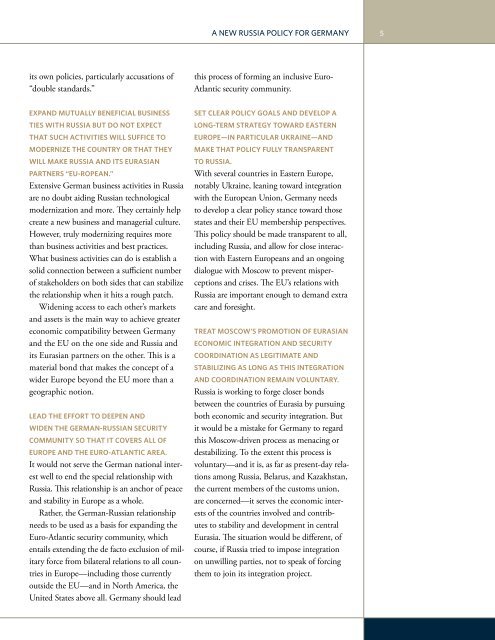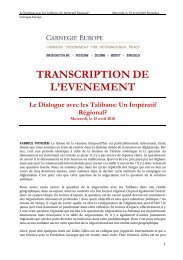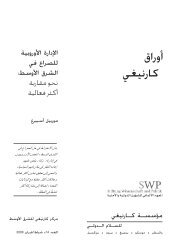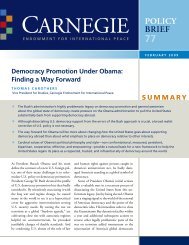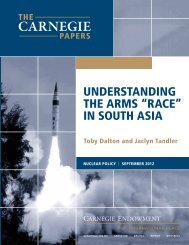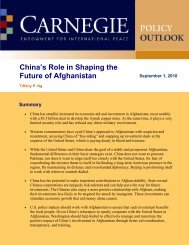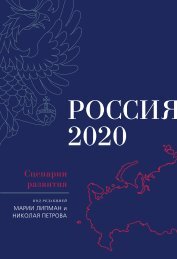A New Russia Policy for Germany - Carnegie Endowment for ...
A New Russia Policy for Germany - Carnegie Endowment for ...
A New Russia Policy for Germany - Carnegie Endowment for ...
Create successful ePaper yourself
Turn your PDF publications into a flip-book with our unique Google optimized e-Paper software.
A NEW RUSSIA POLICY FOR GERMANY 5<br />
its own policies, particularly accusations of<br />
“double standards.”<br />
this process of <strong>for</strong>ming an inclusive Euro-<br />
Atlantic security community.<br />
EXPAND MUTUALLY BENEFICIAL BUSINESS<br />
TIES WITH RUSSIA BUT DO NOT EXPECT<br />
THAT SUCH ACTIVITIES WILL SUFFICE TO<br />
MODERNIZE THE COUNTRY OR THAT THEY<br />
WILL MAKE RUSSIA AND ITS EURASIAN<br />
PARTNERS “EU-ROPEAN.”<br />
Extensive German business activities in <strong>Russia</strong><br />
are no doubt aiding <strong>Russia</strong>n technological<br />
modernization and more. They certainly help<br />
create a new business and managerial culture.<br />
However, truly modernizing requires more<br />
than business activities and best practices.<br />
What business activities can do is establish a<br />
solid connection between a sufficient number<br />
of stakeholders on both sides that can stabilize<br />
the relationship when it hits a rough patch.<br />
Widening access to each other’s markets<br />
and assets is the main way to achieve greater<br />
economic compatibility between <strong>Germany</strong><br />
and the EU on the one side and <strong>Russia</strong> and<br />
its Eurasian partners on the other. This is a<br />
material bond that makes the concept of a<br />
wider Europe beyond the EU more than a<br />
geographic notion.<br />
LEAD THE EFFORT TO DEEPEN AND<br />
WIDEN THE GERMAN-RUSSIAN SECURITY<br />
COMMUNITY SO THAT IT COVERS ALL OF<br />
EUROPE AND THE EURO-ATLANTIC AREA.<br />
It would not serve the German national interest<br />
well to end the special relationship with<br />
<strong>Russia</strong>. This relationship is an anchor of peace<br />
and stability in Europe as a whole.<br />
Rather, the German-<strong>Russia</strong>n relationship<br />
needs to be used as a basis <strong>for</strong> expanding the<br />
Euro-Atlantic security community, which<br />
entails extending the de facto exclusion of military<br />
<strong>for</strong>ce from bilateral relations to all countries<br />
in Europe—including those currently<br />
outside the EU—and in North America, the<br />
United States above all. <strong>Germany</strong> should lead<br />
SET CLEAR POLICY GOALS AND DEVELOP A<br />
LONG-TERM STRATEGY TOWARD EASTERN<br />
EUROPE—IN PARTICULAR UKRAINE—AND<br />
MAKE THAT POLICY FULLY TRANSPARENT<br />
TO RUSSIA.<br />
With several countries in Eastern Europe,<br />
notably Ukraine, leaning toward integration<br />
with the European Union, <strong>Germany</strong> needs<br />
to develop a clear policy stance toward those<br />
states and their EU membership perspectives.<br />
This policy should be made transparent to all,<br />
including <strong>Russia</strong>, and allow <strong>for</strong> close interaction<br />
with Eastern Europeans and an ongoing<br />
dialogue with Moscow to prevent misperceptions<br />
and crises. The EU’s relations with<br />
<strong>Russia</strong> are important enough to demand extra<br />
care and <strong>for</strong>esight.<br />
TREAT MOSCOW’S PROMOTION OF EURASIAN<br />
ECONOMIC INTEGRATION AND SECURITY<br />
COORDINATION AS LEGITIMATE AND<br />
STABILIZING AS LONG AS THIS INTEGRATION<br />
AND COORDINATION REMAIN VOLUNTARY.<br />
<strong>Russia</strong> is working to <strong>for</strong>ge closer bonds<br />
between the countries of Eurasia by pursuing<br />
both economic and security integration. But<br />
it would be a mistake <strong>for</strong> <strong>Germany</strong> to regard<br />
this Moscow-driven process as menacing or<br />
destabilizing. To the extent this process is<br />
voluntary—and it is, as far as present-day relations<br />
among <strong>Russia</strong>, Belarus, and Kazakhstan,<br />
the current members of the customs union,<br />
are concerned—it serves the economic interests<br />
of the countries involved and contributes<br />
to stability and development in central<br />
Eurasia. The situation would be different, of<br />
course, if <strong>Russia</strong> tried to impose integration<br />
on unwilling parties, not to speak of <strong>for</strong>cing<br />
them to join its integration project.


